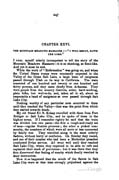
[p. 247]
CHAPTER XXVI.
THE MOUNTAIN MEADOWS MASSACRE:—"I WILL REPAY, SAITH THE LORD."
I FEEL myself utterly incompetent to tell the story of the Mountain Meadows Massacre—it is so shocking, so fiend-like. And yet it must be told.
While the work of "Reformation" was going on, and when the United States troops were constantly expected in the Valley of the Great Salt Lake, a large train of emigrants passed through Utah on its way to California. The train consisted of one hundred and twenty or one hundred and thirty persons, and they came chiefly from Arkansas. They were people from the country districts, sober, hard-working, plain folks, but well-to-do, and, taken all in all, about as respectable a band of emigrants as ever passed through Salt Lake City.
Nothing worthy of any particular note occurred to them until they reached the Valley—that was the point from which they started towards death.
My old friend Eli B. Kelsey travelled with them from Fort Bridger to Salt Lake City, and he spoke of them in the highest terms. If I remember rightly he said that the train was divided into two parts—the first a rough-and-ready set of men—regular frontier pioneers; the other a picked community, the members of which were all more or less connected by family ties. They travelled along in the most orderly fashion, without hurry or confusion. On Sunday they rested, and one of their number who had been a Methodist preacher conducted divine service. All went well until they reached Salt Lake City, where they expected to be able to refit and replenish their stock of provisions: but it was there that they first discovered that feeling of enmity which finally resulted in their destruction.
Now it so happened that the minds of the Saints in Salt Lake City were at that time strongly prejudiced against the
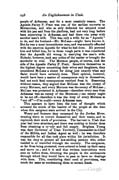
[p. 248]
people of Arkansas, and for a most unsaintly reason. The Apostle Parley P. Pratt was one of the earliest converts to Mormonism, and who so ably defended his adopted creed with his pen and from the platform, had not very long before been sojourning in Arkansas, and had there run away with another man's wife. This was only a trifle for an "Apostle" to do, and the husband—Mr. McLean—might have known it. But he was a most inconsiderate man, and was actually offended with the amorous Apostle for what he had done. He pursued him and killed him, for in those rough parts it was considered that the Apostle did wrong in marrying the man's wife. Nobody, however, took any notice of the matter or brought the murderer to trial. The Mormon people, of course, took the side of the Apostle Parley P. Pratt. Sensitive themselves to the highest degree concerning their wives and daughters, they considered McLean a sinner for doing just exactly what any Saint would have certainly done. Their opinion, however, would have been a matter of consequence only to themselves, had not such fatal consequences resulted from it. Reasoning without reason, they argued that McLean was the enemy of every Mormon, and every Mormon was the enemy of McLean; McLean was protected in Arkansas—therefore every man from Arkansas was an enemy of the Mormons;—an enemy ought to be cut off—therefore it was the duty of every Mormon to "cut off"—if he could—every Arkansas man.
This appears to have been the tone of thought which actuated the minds of the leaders of the people at the time when this emigrant train arrived in the City.
Weary and footsore they encamped by the Jordan River, trusting there to recruit themselves and their teams, and to replenish their stock of provisions. The harvest in Utah that year had been abundant, and there was nothing to hinder them from obtaining a speedy and full supply. Brigham Young was then Governor of Utah Territory, Commander-in-Chief of the Militia, and Indian Agent as well: he was therefore responsible for all that took place within his jurisdiction. It was his duty to protect all law-abiding persons who either resided in or travelled through the country. The emigrants, so far from being protected, were ordered to break up their camp and move on; and it is said that written instructions were sent on before them, directing the people in the settlements through which they would have to pass to have no dealings with them. This, considering their need of provisions, was much the same as condemning them to certain death.
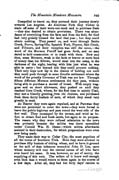
[p. 249]
Compelled to travel on, they pursued their journey slowly towards Los Angeles. At American Fork they wished to trade off some of their worn-out stock and to purchase fresh—they also desired to obtain provisions. There was abundance of everything from the farm and from the field, for God had very greatly blessed the land that year; but they could obtain nothing. They passed on, and went through Battle Creek, Provo, Springville, Spanish Fork, Payson, Salt Creek, and Fillmore, and their reception was still the same,—the word of the Mormon Pontiff had gone forth, and no man dared to hold communion or to trade with them. Now and then, some Mormon, weak in the faith or braver or more fond of money than his fellows, would steal into the camp, in the darkness of the night, bearing with him just what he was able to carry; but beyond this they could procure nothing. Their only hope now lay in the chance of holding out until they could push through to some Gentile settlement where the word of the priestly Governor of Utah was not law. Through fifteen different Mormon settlements did they pass, without being able to purchase a morsel of bread. With empty waggons and on short allowance, they pushed on until they reached Corn Creek, where, for the first time in saintly Utah, they met a friendly greeting from the Indians, and purchased from them thirty bushels of corn, of which they stood very greatly in need.
At Beaver they were again repulsed, and at Parowan they were not permitted to enter the town—they were forced to leave the public highway and pass round the west side of the fort wall. They encamped by the stream, and tried as before to obtain food and fresh cattle, but again to no purpose. The reason why they were refused admission to the town was probably because the militia was there assembled under Colonel Wm. H. Dame—which militia afterwards assisted in their destruction, for which preparations were even now being made.
They made their way to Cedar City, the most populous of all the towns of Southern Utah. Here they were allowed to purchase fifty bushels of tithing wheat, and to have it ground at the mill of that infamous scoundrel John D. Lee, upon whose memory will rest the eternal curses of all who have ever heard his name. It was, however, no act of mercy, the supplying of this corn. The sellers of it knew well enough even then that it would return to them again in the course of a few days. After all, they had but forty days' rations to
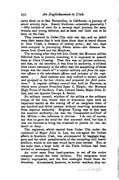
[p. 250]
carry them on to San Bernardino, in California—a journey of about seventy days. Scanty kindness—miserable generosity! —fifty bushels of corn for a seventy days' journey, for men, women, and young children, and at least one little one to be born on the road.
They remained in Cedar City only one day, and so jaded were their teams that it took them thee days to travel thence to Iron Creek, a distance of twenty miles; and two days were occupied in journeying fifteen miles—the distance between Iron Creek and the Meadows.
The morning after they left Iron Creek, the Mormon militia followed them in pursuit, intending, it is supposed, to assault them at Clara Crossing. That this was no private outburst, and that, on the contrary, it was done by authority, is evident from sworn testimony to the effect that the assembling of those troops was the result of "a regular military call from the superior officers to the subordinate officers and privates of the regiments. . . Said regiment was duly ordered to muster, armed and equipped as the law directs, and prepared for field operations." A regular military council was held at Parowan, at which were present President Isaac C. Haight, the Mormon High Priest of Southern Utah, Colonel Dame, Major John D. Lee, and the Apostle George A. Smith.
No military council, whether of the militia or the ordinary troops of the line, would dare to determine upon such an important matter as the cutting off of an emigrant train of one hundred and thirty persons without receiving permission from superior authority. Brigham Young was in this case the superior authority—he was the Commander-in-Chief of the Militia:—the inference is obvious. I do not, of course, say that he gave the order for this accursed deed, but that it was his business to bring the criminals to justice no one can doubt or deny.
The regiment, which started from Cedar City under the command of Major John D. Lee, the sub-agent for Indian affairs in Southern Utah, was accompanied by baggage-waggons and the other paraphernalia of war excepting only heavy artillery, which in this case would have been useless. But, at the same time, a large body of the Piede Indians had been invited to accompany them.
An order came from head-quarters to cut off the entire company except the little children. The emigrants were utterly unprepared, and the first onslaught found them defenceless. Accustomed, however, to border warfare, they im-
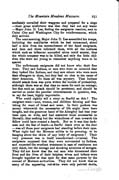
[p. 251]
mediately corralled their waggons and prepared for a siege —their great misfortune was that they had not any water —Major John D. Lee, finding the emigrants resolute, sent to Cedar City and Washington City for reinforcements, which duly arrived.
The next morning, Major John D. Lee assembled his troops, including the auxiliaries which he had summoned, about half a mile from the entrenchment of the fated emigrants, and then and there informed them, with all the coolness which such an infamous scoundrel alone could muster, that the whole company was to be killed, and only the little children who were too young to remember anything were to be spared.
The unfortunate emigrants did not know who their foes were. They saw Indians, or men who were so coloured that they looked like Indians, and they saw others who were more than strangers to them, but they had no clue to the cause of their detention. To them all was mystery. That Indians should attack them was quite within the bounds of probability, although there was at that time no cause for such an outrage; but that such an attack should be persistent, and should be carried on under the peculiar circumstances in question, was, to say the least, highly improbable.
Who could rightly tell a story so fearful as this? The emigrant train—men, women, and children fainting and famishing for want of bread and meat. In their pockets was money wherewith the necessaries of life might have been bought, and the generous hand of the Almighty had that year been open so wide, and had scattered those necessaries so liberally, that nothing but the wickedness of man towards his fellow could have created a dearth. But so it was that darkness and the fear of death—a fearful death even at the door —was all those poor emigrants had standing before their eyes. What right had the Mormon militia to be pursuing, to be hanging about the skirts of any body of emigrants? Their very presence was in itself unauthorized—criminal. The emigrants supposed that they were surrounded by Indians, and expected the cruellest treatment in case of resistance not only death, but the outrage and shocking atrocities of savages. They did not know that the red men who threatened their lives and the lives of their helpless wives and infants were brought together at that spot for that same purpose by the counsel of Mormon authorities. They did not know that so many of the appearing red-skins were only painted devils,
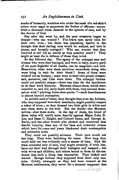
[p. 252]
mocks of humanity, wretches who under the mask of a red-skin's colour were eager to perpetrate the foulest of offences—scoundrels a thousand times damned in the opinion of men, and by the decree of God.
Day after day went by, and the poor creatures began to despair—who can wonder? The brave men cared little for their own lives; but there was something fearful in the thought that their darling ones would be scalped, and torn in pieces, and brutally outraged! Who can wonder that they resolved to sell life as dearly as they possibly could? They might at least die in defence of those they loved.
So day followed day. The agony of the unhappy men and women who were thus besieged, and were in daily, hourly peril of the most frightful of all deaths, can be imagined—not told. Meanwhile, what were those atrocious scoundrels doing who were lying in wait for their blood? Some of them were tricked out as Indians; some were in their own proper dresses; and, moreover, real Utes were there. The unhappy victims could not possibly escape—there was time for the murderers to do their work leisurely. Between chance shots, which were intended to, and did, carry death with them, they amused themselves with "pitching horse-shoe quoits:"—such heartlessness is almost beyond conception.
In terrible need of water, they thought that even the Indians, who they supposed were their assailants, might possibly respect a token of truce; so they dressed two little girls in white and sent them down to the well. But the fiends—the Mormon militia—shot them down. In the day of doom, the blood of those babes will testify more heavily against Major John D. Lee, and Isaac C. Haight, and Colonel Dame, and George A. Smith, and the other wretch who plotted and contrived that fearful iniquity, than any of the base and cowardly crimes which have for years and years blackened their contemptible and miserable souls.
They could not possibly advance. Their corn would not last long. They were famishing for water. How long they could hold out was evidently only a matter of time. Had the train consisted only of men, they might certainly, if with loss, have cut their way through their besiegers and escaped; but with wives and children, and others bound to them by the tenderest ties, such a thing was impossible. They looked and waited. Savage Indians they supposed were their only enemies. Coldly, strangely as they had been treated at the Mormon settlements, they never for a moment supposed that
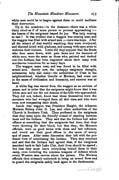
[p. 253]
white men could be in league against them or could meditate their destruction.
Up in the meadows—in the distance—there was a white dusty cloud as if of some person or persons approaching the hearts of the emigrants leaped for joy. Was help coming at last? It was evident that a waggon was coming near, and the waggon was filled with armed men;—here was hope. After all the misery of that waitful watching, they were overjoyed, and shouted aloud with gladness, and sprang with open arms to welcome their visitors. Little did they suppose that the fiends who then came down, with pale faces and the manners of white men, were the same as those who, painted and decked out like Indians, had been leaguered about their camp with murderous intentions for so many days.
The waggon came near, and was found to be filled with armed men. Surely now, the unhappy emigrants thought, substantial help had come—the authorities of Utah in the neighbourhood, whether Gentile or Mormon, had come out in the cause of civilization and humanity, and succour was at hand.
A white flag was waved from the waggon as an emblem of peace, and in order that the emigrants might know that it was white men and not the red demons of the hills who approached. They did not, indeed, know that these themselves were the monsters who had wronged them all this time, and who were even now compassing their death.
Inside that waggon was President Haight, the infamous Mormon Bishop John D. Lee, and other authorities of the Church in Southern Utah. They professed to the emigrants that they came upon the friendly errand of standing between them and the Indians. They said that the Indians had taken offence at something that the emigrants had done, that they were thirsting for their blood, but that they, the Mormon officials, were on good terms with them and had influence, and would use their good offices in the cause of mercy and of peace. After some discussion they left with the professed view of conciliating the Indians. Then they returned and said that the Indians had agreed that, if the emigrants marched back to Salt Lake City, their lives should be spared; but that they must leave everything behind them in their camp, even including the common weapons of defence which every Western man carries about his person. The Mormon officials then solemnly undertook to bring an armed force and to guard the emigrants safely back again to the Settlements.
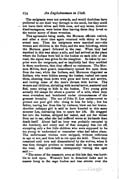
[p. 254]
The emigrants were not cowards, and would doubtless have preferred to cut their way through to the south, but they could not leave their wives and little ones, and any terms, however disadvantageous, were better than leaving those they loved to the tender mercy of those wretches.
This agreement being made, the Mormon officials retired, and after a short time again returned with thirty or forty armed men. Then the emigrants were marched out—the women and children in the front, and the men following, while the Mormon guard followed in the rear. When they had marched in this way about a mile, and had arrived at the place where the Indians were hid in the bushes on each side of the road, the signal was given for the slaughter. So taken by surprise were the emigrants, and so implicitly had they confided in these murderers, that they offered no resistance. The Mormon Militia, their guard, immediately opened fire upon them from the rear, while the Indians, and Mormons disguised as Indians, who were hidden among the bushes, rushed out upon them, shooting them down with guns and bows and arrows, and cutting some of the men's throats with knives. The women and children, shrieking with mortal terror, scattered and fed, some trying to hide in the bushes. Two young girls actually did escape for about a quarter of a mile, when they were overtaken and butchered under circumstances of the greatest brutality. The son of John D. Lee endeavoured to protect one poor girl who clung to him for help; but his father, tearing her from him by violence, blew out her brains. Another unhappy girl is said to have kneeled to this same monster Lee, entreating him to spare her life. He dragged her into the bushes, stripped her naked, and cut her throat from ear to ear, after she had suffered worse at his hands than death itself. About half an hour was probably occupied in the butchery, and every soul of that company was cut off, excepting only a few little children who were supposed to be too young to understand or remember what had taken place. The unfortunate victims were stripped, without reference to age or sex, and then left to rot upon the field. There they remained until torn and dismembered by the wolves, when it was then thought prudent to conceal such as lay nearest to the road. An eye-witness subsequently visiting the spot said:
"The scene of the massacre, even at this late day, was horrible to look upon. Women's' hair in detached locks and in masses hung to the sage bushes and was strewn over the
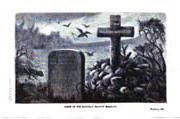
[p. unnumbered]
SCENE OF THE MOUTAIN MEADOW MASSACRE
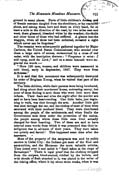
[p. 255]
ground in many places. Parts of little children's dresses and of female costume dangled from the shrubbery, or lay scatter t about, and among these, here and there on every hand, for at least a mile in the direction of the road, by two miles east and west, there gleamed, bleached white by the weather, the skulls and other bones of those who had suffered. A glance into the waggon, when all these had been collected, revealed a sight which never can be forgotten."
The remains were subsequently gathered together by Major Carleton, the United States Commissioner, who erected over them a large cairn of stones, surmounted by a cross of red cedar, with the inscription thereon: "Vengeance is wins: I will repay, saith the Lord;" and on a stone beneath were en-graved the words:—
"Here 120 men, women, and children were massacred in cold blood, early in September, 1857. They were from Arkansas."
It is said that this monument was subsequently destroyed by order of Brigham Young, when he visited that part of the territory.
The little children, while their parents were being butchered, had clung about their murderers' knees, entreating mercy, but none of them finding it save those who were little more than infanta. Their fears and cries the night after the murder are said to have been heart-rending. One little babe, just beginning to walk, was shot through the arm. Another little girl was shot through the ear, and the clothes of most of them were saturated with their mothers' blood. They were distributed among the people of the settlements, and when finally the Government took them under the protection of the nation, the people among whom these little ones lived actually charged for their boarding. Two of them are said to have uttered some words from which it was presumed that their intelligence was in advance of their years. They were taken out quietly and buried! This happened some time after the massacre.
Most of the property of the emigrants was sold by public auction in Cedar City: the Indians got most of the flour and ammunition, and the Mormons the more valuable articles. They jested over it and called it "Spoil taken at the siege of Sevastopol." There is legal proof that the clothing stripped from the corpses, blood-stained, riddled by the bullets, and with shreds of flesh attached to it, was placed in the cellar of the tithing office, where it lay about three weeks, when it was
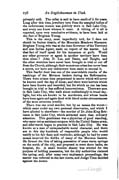
[p. 256]
privately sold. The cellar is said to have smelt of it for years. Long after this time, jewellery torn from the mangled bodies of the unfortunate women was publicly worn in Salt Lake City, and every one knew whence it came. A tithing of it all is reported, upon very conclusive evidence, to have been laid at the feet of Brigham Young.
This is the story, most imperfectly told, for I dare not sketch its foulest details, of the Mountain Meadows Massacre. Brigham Young, who was at the time Governor of the Territory and also Indian Agent, made no report of the matter. Let that fact of itself speak for his innocence or guilt. Would any other governor or agent in another territory have been thus silent? John D. Lee, and Dame, and Haight, and the other wretches have never been brought to trial or cut off from the Church, although their monstrous crime has never been a secret, nor have any endeavours been made to conceal it.
This fearful deed was one of the unavoidable results of the teachings of the Mormon leaders during the Reformation. There were crimes then perpetrated in secret which will never be known until the day of doom; and there were horrors which have been known and recorded, but for which no one has been brought to trial or has suffered inconvenience. There are men in Salt Lake City, who walk about unblushingly in broad day-light, but who are known to be murderers, and whose hands have been again and again dyed with blood under circumstances of the most atrocious cruelty.
There was one cruel murder, but by no means the worst—which came under my own personal observation, and which I have alluded to elsewhere—the murder of Dr. John King Robinson in Salt Lake City, which attracted more than ordinary attention. This gentleman was a physician of good standing, who came out as assistant-surgeon with the United States army, and afterwards began to practise in Salt Lake City. He was known as a man of unimpeachable moral character, and there are to this day hundreds of responsible people who would testify to his fair fame and rectitude; although he had by some means incurred the dislike of many of the Mormon leaders. He formed the idea of taking possession of some warm springs on the north of the city, and proposed to erect there baths, an hospital, &c. A small wooden shanty was erected for the purpose of holding possession, but the city authorities claimed the spring, and, after some very unpleasant proceedings, the matter was referred to the law courts, and Judge Titus decided against the doctor.
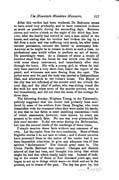
[p. 257]
After this verdict had been rendered, Dr. Robinson seems to have acted very prudently, and to have remained in-doors as much as possible during the succeeding days. Between eleven and twelve o'clock on the night of the third day, however, after the family had retired to rest, a man called at the house, and stating that his brother had broken his leg by a fall from a mule and was suffering very much, he, after some earnest persuasion, induced the doctor to accompany him. Anxious as he might be to remain in-doors at such a time, no professional man would refuse to perform an act of mercy. He accordingly went. At a distance of about a couple of hundred steps from the house he was struck over the head with some sharp instrument, and immediately after shot through the brain. His wife, a young girl, to whom he had only been married a very short time, heard the report of the pistol, and witnesses saw men fleeing from the spot. The police were sent for, and the body was carried to Independence Hall, and afterwards to the victim's house. The Mayor of the city was not informed of the murder until ten o'clock the next day, and the chief of police, who was sitting round the fire with his men when news of the murder arrived, went to bed immediately, and did not visit the scene of the outrage for three days.
The following Sunday, Brigham Young, in the Tabernacle, publicly suggested that the doctor had probably been murdered by some of the soldiers from Camp Douglas, who were dissatisfied with his treatment when they were under his hands, or else that he had fallen in some gambling transaction—both of which statements, however, were known by every one present to be utterly false. No one was ever prosecuted for this cruel murder. It did not occur during the Reformation, but was the natural result of the teachings of those times.
I simply mention these facts without any comment of my own. Let the reader form his own conclusion. More of these frightful stories I do not care to relate; and I should not even have presented these to the notice of the reader had it not been impossible otherwise to give any adequate idea of that terrible "Reformation." The Gentile army came in. The Union Pacific Railroad was opened. Changes and chances altered all that had been, and brought into being that which might be, and that which finally really was. Instead of looking to the events of three or four thousand years ago, men began to act up to things which were—to think and act in the present, not to dream of the past. The day has gone by, but
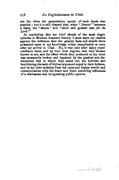
[p. 258]
not far, when the perpetration openly of such deeds was possible; but it is still boasted that, when "Deseret" becomes a State, the "Saints" will "show still greater zeal for the Lord!"
In concluding this too brief sketch of the most tragic episodes in Mormon domestic history, I must warn my readers against the inference that the ghastly facts and details there presented came to my knowledge either immediately or soon after my arrival in Utah. No, it was only after many years' residence there, and by very slow degrees, that they became known to me, and the effect which they produced on my mind was necessarily broken and impaired by the gradual and disconnected way in which they oozed out, the horrible and bewildering travesty of biblical argument urged in their defence, and by my utter isolation from the outer and higher world, and communication with the heart and brain ennobling influences of a wholesome and invigorating public opinion.
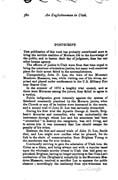
[p. 380]
POSTSCRIPT.
THE publication of this book has probably contributed more to bring the terrible realities of Mormon life to the knowledge of the public, and to hasten their day of judgment, than has any other human agency.
The officers of justice in Utah were from that time urged to bring the notorious criminals to justice, but many well-contrived plans for their arrest failed in the accomplishment.
Unexpectedly, John D. Lee, the hero of the Mountain Meadows Massacre, was, while visiting one of his wives, surprised and placed under confinement in the U.S. Military Fort near Beaver City.
In the summer of 1875 a lengthy trial ensued, and as there were Mormons among the jurors, they failed to agree in a verdict.
Public indignation grew intensely against the system of falsehood constantly practised by the Mormon jurors, when the Church or any of its leaders were interested in the courts, and a second trial of John D. Lee was earnestly demanded.
During his first trial the Apostle George A. Smith, Brigham's favourite and counsellor, who was undoubtedly the instrument through whom Lee and his associates had been "counselled" to destroy the emigrants, was still living, and to screen him it was necessary that Lee should escape the penalty of his crime.
Between the first and second trials of John D. Lee, Smith died, and Lee might now confess what he pleased, for the link in the chain of communication from Brigham Young to the murderers was for ever broken.
Continually striving to gain the admission of Utah into the Union as a State, and being always met with a repulse based upon the wholesale murder crimes in Utah that had gone unpunished, Brigham, having no longer anything to fear from Lee's confessions of his (Brigham's) complicity in the Mountain Meadows Massacre, resolved to sacrifice Lee to appease the public clamour; accordingly the testimony from eye-witnesses was
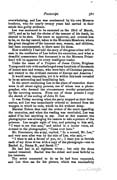
[p. 381]
overwhelming, and Lee was condemned by his own Mormon brethren, who for nearly twenty years had carried in their minds this guilty evidence.
Lee was sentenced to be executed on the 23rd of March, 1877, and as he had the choice of the manner of his death, he elected to be shot. The court so approved, and ordered him to be, on the day named, taken to the Mountain Meadows, where the great slaughter of the innocent men, women, and children, had been consummated, to there meet his doom.
How truthfully I had told the story of this great crime will be seen in the confession of Lee before his execution; and what a dreadful commentary that document is on the Mormon Priesthood will be apparent to every intelligent reader.
Under the name of a Prophet of Jesus Christ, Brigham Young could rule with unchallenged sway hundreds of thousands of honest men and women, who were born of Christian parents, and trained in the civilized customs of Europe and America!
It would seem impossible, yet it is within this book revealed to be an astounding and humiliating fact.
In the escort conducting Lee to the place of execution there were in all about eighty persons, one of whom was a photographer, who deemed the circumstance worthy perpetuation by the unerring camera. From one of those present I copy the sketch of the ending of John D. Lee.
It was Friday morning when the party stopped at their destination, and Lee was immediately ordered to descend from the waggon in which he rode, which he did without delay.
Marshal Nelson then read the orders of the court regarding the execution, and when the reading was concluded, Lee was asked if he had anything to say. Just at this moment the photographer was arranging his camera to take a picture of the prisoner. Lee caught sight of him, and pointing to him said, "I want to see that man," and added in a louder voice, addressed to the photographer, "Come over here."
Mr. Fennimore, the artist, replied, "In a second, Mr. Lee," and very soon after was by the side of Lee, who said, "I want to ask a favour of you, sir; I want you to furnish each of my three wives with a copy of the photograph—one to Rachel A., Emma B., and Sarah C."
He had had in all eighteen wives; but only the three named remained. Rachel was the oldest and most faithful to his interests.
The artist consented to do as he had been requested, and Lee then sat for his picture, which was successfully
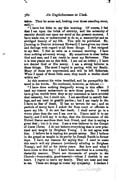
[p. 382]
taken. Then he arose and, looking over those standing about, said,—
"I have but little to say this morning. Of course, I feel that I am upon the brink of eternity, and the solemnity of eternity should rest upon my mind at tho present moment. I have made out, or endeavoured to do so, a manuscript and an abridged history of my life. This will be published. Sir, [turning to District Attorney Howard] I have given my views and feelings with regard to all these things. I feel resigned to my fate. I feel as calm as a summer morning. I have done nothing adversely wrong. My conscience is clear before God and man, and I am ready to meet my Redeemer. This it is that places me on this field. I am not an infidel; I have not denied God or His mercy. I am a strong believer in these things. The most I regret is parting with my family. Many of them are unprotected, and will be left fatherless. When I speak of those little ones, they touch a tender chord within me."
At this moment his voice trembled, and he perceptibly faltered in his words. He continued, however, as follows:—
"I have done nothing designedly wrong in this affair. I used my utmost endeavours to save those people. I would have given worlds were they at my command to have avoided that calamity, but I could not. I am sacrificed to satisfy feelings, and am used to gratify parties; but I am ready to die. I have no fear of death. It has no terrors for me; and no particle of mercy have I asked for from court or officials to spare my life. I do not fear death. I shall never go to a worse place than the one I am now in. I have said it to my family, and I will say it to-day, that the Government of the United States sacrifices their best friend, and that is saying a great deal; but it is true. I am a true believer in the Gospel of Jesus Christ. I do not believe everything that is now practised and taught by Brigham Young. I do not agree with him. I believe he is leading his people astray. But I believe in the gospel as taught in its purity by Joseph Smith in former days. I have my reasons for saying this. I used to make this man's will my pleasure (evidently alluding to Brigham Young), and did so for thirty years. See how and what I have come to this day! I have been sacrificed in a cowardly, dastardly manner. There are thousands of people in the Church—honourable, good-hearted—whom I cherish in my heart. I regret to leave my family. They are near and dear to me. These are things to rouse my sympathy. I declare I
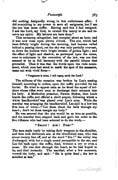
[p. 383]
did nothing designedly wrong in this unfortunate affair. I did everything in my power to save all emigrants, but I am the one that must suffer. Having said this I feel resigned. I ask the Lord, my God, to extend His mercy to me and receive my spirit. My labours are here done."
This ceremony, altogether, had occupied about an hour, and it was now close upon eleven o'clock. The sun, which had been fitfully bright during the morning, had become veiled behind a passing cloud, yet the sky was only partially overcast, as down the horizon were bright streaks of golden light; and the effect of light and shadow, as portrayed upon the scene, soon to culminate in the execution of the law, was one that seemed to be in fall harmony with the painful silence that prevailed. Then it was that the words upon the rude monument, which once had stood to mark the spot of the massacre, came out with vivid force—
"Vengeance is mine, I will repay, saith the Lord."
The stillness of the occasion was broken by Lee's seating himself, according to orders, upon the coffin provided for his burial. He tried to appear calm as he faced the squad of soldiers whose rifles were soon to discharge their contents into his body. A Methodist preacher, Parson Stokes, then knelt beside the coffin and offered a short prayer, following which a white handkerchief was placed over Lee's eyes. While the marshal was arranging the handkerchief, Lee said in a low but firm tone of voice—"Let them shoot the balls through my heart; don't let them mangle my body."
He was assured that the aim would be as true as possible, and the marshal then stepped back and gave his order to the five riflemen who had been selected to do the work,—
"READY! AIM! FIRE!"
The men made ready by raising their weapons to the shoulder, and then took deliberate aim at the blindfolded man, who was about twenty feet off, and at the word "fire I" the volley was discharged, with but a single sound perceptible to the ear, and Lee fell back upon the coffin, dead, without a cry or even a moan. He was shot through the heart, as he had hoped to be, and died instantly. The marshal, after a few moments, viewed the body, and said: "He is quite dead; the law is satisfied at last."
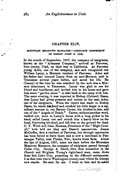
[p. 384]
CHAPTER XLIV.
MOUNTAIN MEADOWS MASSACRE—COMPLETE CONFESSION OF BISHOP John D. Lee.
IN the month of September, 1857, the company of emigrants, known as the "Arkansas Company," arrived at Parowan, Iron county, Utah, on their way to California. At Parowan young Aden, one of the company, saw and recognized one William Laney, a Mormon resident of Parowan. Aden and his father had rescued Laney from an anti-Mormon mob in Tennessee several years before, and saved his life. He (Laney) at the time he was attacked by the mob was a Mormon missionary in Tennessee. Laney was glad to see his friend and benefactor, and invited him to his house and gave him some "garden sauce" to take back to the camp with him. The same evening, it was reported to Bishop (Colonel) Dame, that Laney had given potatoes and onions to the man Aden, one of the emigrants. When the report was made to Bishop Dame, he raised his hand and crooked his little finger in a significant manner to one Barney Carter, his brother-in-law, and one of the "Angels of Death." Carter, without another word, walked out, went to Laney's house with a long picket in his hand, called Laney out and struck him a heavy blow on the head, fracturing his skull, and left him on the ground for dead. C. Y. Webb and Isaac Naoman, President of the "High Council," both told me they saw Dame's man™uvres. James McGuffee, then a resident of Parowan, but through oppression has been forced to leave there and is now a merchant in Pahranagat Valley, near Pioche, Nev., knows these facts. About the last of August, 1857, some ten days before the Mountain Meadows Massacre, the company of emigrants passed through Cedar City. George A. Smith, then first counsellor in the Church and Brigham Young's right-hand man, came down from Salt Lake City, preaching to the different settlements. I at that time was in Washington county, near where St. George now stands. He sent for me. I went to him and he asked
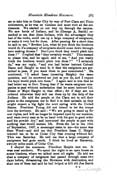
[p. 385]
me to take him to Cedar City by way of Fort Clara and Pinto settlements, as he was on business and must visit all the settlements. We started on our way up through the canyon. We saw herds of Indians, and he (George A. Smith) re-marked to me that these Indians, with the advantages they had of the rocks, could use up a large company of emigrants, or make it very hot for them. After pausing for a short time he said to me, "Brother Lee, what do you think the brethren would do if a company of emigrants should come down through here making threats? Don't you think they would pitch into them?" I replied that "they certainly would." This seemed to please him, and he again said to me, "And you really think the brethren would pitch into them?" " I certainly do," was my reply, "and you had better instruct Colonel Dame and Haight to tend to it that the emigrants are permitted to pass, if you want them to pass unmolested." He continued, "I asked Isaac (meaning Haight) the same question, and he answered me just as you do, and I expect the boys would pitch into them." I again said to him that he had better say to Gov. Young that if he wants emigrant companies to pass without molestation that be must instruct Col. Dame or Major Haight to that effect; for if they are not ordered otherwise they will use them up by the help of the Indians. He told the people at the Clara not to sell their grain to the emigrants, nor to feed it to their animals, as they might expect a big fight the next spring with the United States. President Young did not intend to let the troops into the territory. He said: "We are going to stand up for our rights, and will no longer be imposed upon by our enemies, and want every man to be on hand with his gun in good order and his powder dry," and instructed the people to part with nothing that would sustain life. From the 1st to the 10th of September, 1857, a messenger came to me—his name was Sam Wood—and told me that President Isaac C. Haight wanted me to be at Cedar City that evening without fail. This was Saturday. He told me that a large company of emigrants had gone south. I think he lived at Harmony, twenty miles south of Cedar City.
I obeyed the summons. President Haight met me. It was near sundown. We spent the night in an open house on some blankets, where we talked most all night. He told me that a company of emigrants had passed through some two days before, threatening the Mormons with destruction, and that one of them had said he had helped to kill old Joe Smith
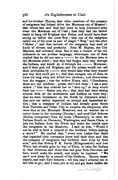
[p. 386]
and his brother Hyrum, that other members of the company of emigrants had helped drive the Mormons out of Missouri; that others had said they had come to help Johnson's army clean the Mormons out of Utah; that they had the halters ready to hang old Brigham and Heber, and would have them strung up before the snow flew; that one of the emigrants called one of his oxen (a pair of stags) "Brig." and the other "Heber;" and that several of the emigrants had used all kinds of threats and profanity. John M. Higbee, the City Marshal, had informed them that it was a breach of the city ordinance to use profane language, whereupon one of them replied that he did not care a —— for the Mormon laws or the Mormons either; that they had fought their way through the Indians, and would do it through the ——Mormons; and if their god, old Brigham, and his priests would not sell their provisions, by they would take what they wanted any way they could get it; that thus enraged, one of them let loose his long whip and killed two chickens, and threw-them into the waggon; that the widow Evans said, "Gentlemen, those are my chickens; please don't kill them; I am a poor widow;" that they ordered her to "shut up," or they would blow her brains out, etc.; that they had been raising trouble with all the settlements and Indians on their way; that we were threatened on the North by Johnson's army; that now our safety depended on prompt and immediate action; that a company of Indians had already gone South from Parowan and Cedar City to surprise the emigrants, who were then at the Mountain Meadows, and he wanted me to return home in the morning (Sunday), and send Carl Schurtz (Indian interpreter) from my home (Harmony), to raise the Indians South, at Harmony, Washington, and Santa Clara, to join the Indians from the North and make the attack upon the emigrants at the Meadows. I said to him, "Would it not be well to hold a council of the brethren before making a move?" He replied that "every true Latter-Day Saint that regarded their covenants knew well their duty, and that the company of emigrants had forfeited their lives by their acts," and that Bishop P. K. Smith (Klingensmith) and Joel White had already gone by way of Pinto, to raise the Indians in that direction, and those that had gone from Parowan and here would make the attack, and might be repulsed. "We can't now delay for a council of the brethren. Return immediately, and start Carl Schurtz; tell him that I ordered you to tell him to go; and I want you to try and get there before the
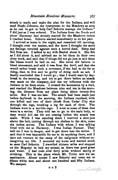
[p. 387]
attack is made, and make the plan for the Indians, and will send Nephi Johnson, the interpreter, to the Meadows as soon as be can be got to help Carl Schurtz manage the Indians." I did just as I was ordered. The Indians from the North and about Harmony had already started for the Meadows before I reached home. Schurtz started immediately to do his part.
I arrived at home in the night, and remained till morning. I thought over the matter, and the more I thought the more my feelings revolted against such a horrid deed. Sleep had fled from me. I talked to my wife Rachel about it. She felt as I did about it, and advised me to let them do their own dirty work, and said that if things did not go just to suit them the blame would be laid on me. She never did believe in blood atonement, and said it was from the devil, and that she would rather break such a covenant, if she had to die for so doing, than to live and be guilty of doing such an act. I finally concluded that I would go; that I would start by day-break in the morning, and try to get there before an attack was made on the company, and use my influence with the Indians to let them alone. I crossed the mountains by a trail, and reached the Meadows between nine and ten in the morning, the distance from my place being about twenty-five miles. But I was too late. The attack had been made just before daybreak in the morning, the Indians repulsed, with one killed and two of their chiefs from Cedar City shot through the legs, breaking a leg for each of them. The Indians were in a terrible rage. I went to some of them that were in a ravine. They told me to go to the main body, or they would kill me for not coming before the attack was made. While I was standing there I received a shot just above the belt, cutting through my clothes to the skin, some six inches across. The Indians with whom I was talking lived with me at Harmony. I was Indian Farmer. They told me I was in danger, and to get down into the ravine. I said that it was impossible for me to do anything there, and I dare not venture to the camp of the emigrants without endangering my life. I mounted my horse and started south to meet Carl Schurtz. I travelled sixteen miles and stopped on the Megotsy to bait my animal, as there was good grass and water. I had rode over forty miles without eating or drinking. This is the place where Mr. Tobin met his assassinators. About sunset I saw Schurtz and some ten or fifteen white men and about one hundred and fifty Indians. We camped.
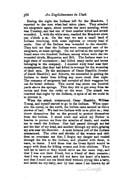
[p. 388]
During the night the Indians left for the Meadows. I reported to the men what had taken place. They attacked the emigrants again, about sunrise the next morning, which was Tuesday, and had one of their number killed and several wounded. I, with the white men, reached the Meadows about one o'clock p. m. On the way we met a small band of Indians returning, with some eighteen or twenty head of cattle. One of the Indians was wounded in the shoulder. They told me that the Indians were encamped east of the emigrants, at some springs. On our arrival at the springs we found some two hundred Indians, among whom were the two wounded chiefs, Moqueetus and Bill. The Indians were in a high state of excitement; had killed many cattle and horses belonging to the company. I counted sixty head near their encampment, that they had killed in revenge for the wounding of their men. By the assistance of Oscar Hamblin (brother of Jacob Hamblin) and Schurtz, we succeeded in getting the Indians to desist from killing any more stock that night. The company of emigrants had corraled all their waggons but one for better defence. This corral was about one hundred yards above the springs. This they did to get away from the ravine and from the rocks on the west. The attack was renewed that night by the Indians, in spite of all we could do to prevent it.
When the attack commenced, Oscar Hamblin, William Young, and myself started to go to the Indians. When opposite the corral, on the north, the bullets came around us like a shower of hail. We had two Indians with us to pilot us; they threw themselves flat on the ground to protect themselves from the bullets. I stood erect and asked my Father in heaven to protect me from the missiles of death, and enable me to reach the Indians. One ball passed through my hat and the hair of my head, and another through my shirt, grazing my arm near the shoulder. A most hideous yell of the Indians commenced. The cries and shrieks of the women and children so overcame me that I forgot my danger and rushed through the fire to the Indians, and pleaded with them, in tears, to desist. I told them that the Great Spirit would be angry with them for killing women and little children. They told me to leave or they would serve me the same way, and that I was not their friend, but a friend of their enemies; that I was a squaw, and did not have the heart of a brave, and that I could not see blood shed without crying like a baby, and called me cry-baby, and by that name I am known by all
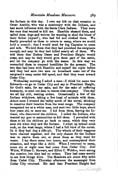
[p. 389]
the Indians to this day. I owe my life on that occasion to Oscar Amblin, who was a missionary with the Indians, and had much influence with the Santa Clara Indians. They were the ones that wanted to kill me. Hamblin shamed them, and called them dogs and wolves for wanting to shed the blood of their father (myself), who had fed and clothed them. We finally prevailed on them to return to camp, where we would hold a council; that I would send for big Captains to come and talk. We told them that they had punished the emigrants enough, and may be they had killed nearly all of them. We told them that Bishop Dame and President Haight would come, and may be they would give them part of the cattle, and let the company go with the teams. In this way we reconciled them to suspend hostilities for the present. The two that had been with Hamblin and myself the night before said they had seen two men on horseback come out of the emigrant's camp under full speed, and that they went toward Cedar City.
Wednesday morning I asked a man—I think his name was Edwards—to go to Cedar City and say to President Haight, for God's sake, for my sake, and for the sake of suffering humanity, to send out men to rescue that company. This day we all lay still, waiting orders. Occasionally a few of the Indians withdrew, taking a few head of animals with them. About noon I crossed the valley north of the corral, thinking to examine their location from the west range. The company recognized me as a white man, and sent two little boys, about four years old, to meet me. I hid from them, fearing the Indians, who discovered the children. I called the Indians, who wanted my gun or ammunition to kill them. I prevailed with them to let the children go back to camp, which they very soon did when they saw the Indians. I crept up behind some rock, on the west range, where I had a full view of the corral. In it they had dug a rifle-pit. The wheels of their waggons were chained together, and the only chance for the Indians was to starve them out, or shoot them as they went for water. I lay there some two hours, and contemplated their situation, and wept like a child. When I returned to camp, some six or eight men had come from Cedar City. Joel White, William C. Stewart, and Elliot C. Weldon, were among the number, but they had no orders. They had come merely to see how things were. The Meadows are about fifty miles from Cedar City. Thursday afternoon the messenger from Cedar City returned. He said that President Haight had
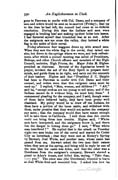
[p. 390]
gone to Parowan to confer with Col. Dame, and a company of men and orders would be sent on to-morrow (Friday); that up to the time he had left, the council had come to no definite conclusion. During this time the Indians and men were engaged in broiling beef and making up their hides into lassos. I had flattered myself that bloodshed was at an end. After the emigrants saw me cross the valley, they hoisted a white flag in the midst of their corral.
Friday afternoon four waggons drove up with armed men. When they saw the white flag in the corral, they raised one also, but drove to the springs where we were, and took refreshment, after which a council meeting was called of Presidents, Bishops, and other Church officers and members of the High Council, societies, High Priests, &c. Major John M. Higbee presided as chairman. Several of the dignitaries bowed in prayer, invoked the aid of the Holy Spirit to prepare their minds, and guide them to do right, and carry out the counsels of their leaders. Higbee said that "President J. C. Haight had been to Parowan to confer with Col. Dame and their counsel, and orders were that this emigrant camp must be used up." I replied, "Men, women, and children?" "All," said he, "except such as are too young to tell tales; and if the Indians cannot do it without help, we must help them." I commenced pleading for the company, and I said, though some of them have behaved badly, they have been pretty well chastised. My policy would be to draw off the Indians, let them have a portion of the loose cattle, and withdraw with them, under promise that they would not molest the company any more; that the company would then have teams enough left to take them to California. I told them that this course could not bring them into trouble. Higbee said, "White men have interposed, and the emigrants know it, and there lies the danger in letting them go." I said, "What white man interfered?" He replied that in the attack on Tuesday night two men broke out of the corral and started for Cedar City on horseback; that they were met at Richey's Spring by Stewart, Joel White, and another man, whose name has passed from me. Stewart asked the two men their names when they met at the spring, and being told in reply by one of the men that his name was Aden, and that the other was a Dutchman from the emigrant's company, Stewart shoved a pistol to Aden's breast, and killed him, saying, "Take that, — you." The other man (the Dutchman) wheeled to leave as Joel White fired and wounded him. I asked him how he
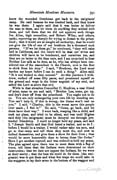
[p. 391]
knew the wounded Dutchman got back to the emigrants' camp. He said because he was tracked back, and they knew he was there. I again said that it was better to deliver the man to them, and let them do anything they wished with them, and tell them that we did not approve such things. Ira Allen, high councillor, and Robert Wiley, and others, spoke, reproving me sharply for trying to dictate to the priesthood; that it would set at naught all authority; that he would not give the life of one of our brethren for a thousand such persons. "If we let them go," he continued, "they will raise hell in California, and the result will be that our wives and children will have to be butchered, and ourselves too, and they are no better to die than ours, and I am surprised to hear Brother Lee talk as be does, as he, who has always been considered one of the staunchest in the Church, now is the first to shirk from his duty." I said, "Brethren, the Lord must harden my heart before I can do such a thing." Allen said, "It is not wicked to obey counsel." At this juncture I withdrew, walked off some fifty paces, and prostrated myself on the ground and wept in the bitter anguish of my soul, and asked the Lord to avert that evil.
While in that situation Councillor C. Hopkins, a near friend of mine, came to me and said, "Brother Lee, come, get up, and don't draw off from the priesthood. You ought not to do so. You are only endangering your own life by standing out. You can't help it, if this is wrong; the blame won't rest on you." I said, "Charley, this is the worst move this people ever made; I feel it." He said, "Come, go back, and let them have their way." I went back, weeping like a child, and took my place, and tried to be silent, and was until Higbee said they (the emigrants) must be decoyed out through pretended friendship. I could no longer hold my peace, and said I, "Joseph Smith said that God hated a traitor, and so do I: before I would be a traitor, I would rather take ten men, and go to that camp and tell them they must die, and now to defend themselves, and give them a show for their lives; that would be more honourable than to betray them like Judas." Here I got another reproof, and was ordered to hold my peace. The plan agreed upon there was to meet them with a flag of truce, tell them that the Indians were determined on their destruction; that we dare not oppose the Indians, for we were at their mercy; that the best we could do for them (the emigrants) was to get them and what few traps we could take in the waggons, to lay their arms in the bottom of the waggon and
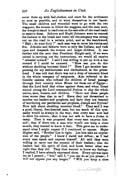
[p. 392]
cover them up with bed-clothes, and start for the settlement as soon as possible, and to trust themselves in our hands. The small children and wounded were to go with the two waggons, the women to follow the waggons, and the men next, the troops to stand in readiness on the east side of the road ready to receive them. Schurtz and Nephi Johnson were to conceal the Indians in the brush and rocks till the company was strung out on the road to a certain point, and at the watchword, "Halt; do your duty!" each man was to cover his victim and fire. Johnson and Schurtz were to rally the Indians, and rush upon and despatch the women and larger children. It was further told the men that President Haight said, if we were united in carrying out the instructions, we would all receive "celestial reward." I said I was willing to put up with a less reward if I could be excused." How can you do this without shedding innocent blood?" Here I got another lampooning for my stubbornness and disobedience to the priesthood. I was told that there was not a drop of innocent blood in the whole company of emigrants. Also referred to the Gentile nations who refused the children of Israel passage through their country when Moses led them out of Egypt—that the Lord held that crime against them, and when Israel waxed strong the Lord commanded Joshua to slay the whole nation, men, women, and children. "Have not these people done worse than that to us? Have they not threatened to murder our leaders and prophets, and have they not boasted of murdering our patriarchs and prophets, Joseph and Hyrum? Now talk about shedding innocent blood." They said I was a good, liberal, free-hearted man, but too much of this sympathy would be always in the way; that every man now bad to show his colours; that it was not safe to have a Judas in camp. Then it was proposed that every man express himself; that if there was a man who would not keep a close mouth, they wanted to know it then. This gave me to understand what I might expect if I continued to oppose. Major Higbee said, "Brother Lee is right. Let him take an expression of the people." I knew I dared not refuse; so I had every man speak and express himself. All said they were willing to carry out the counsel of their leaders; that the leaders had the spirit of God, and knew better what was right than they did. They then wanted to know my feelings. I replied, I have already expressed them. Every eye was upon me as I paused; "but," said I," you can do as you please; I will not oppose you any longer." "Will you keep a close
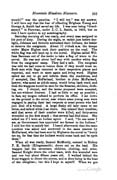
[p. 393]
mouth?" was the question. "I will try," was my answer. I will here say that the fear of offending Brigham Young and George A. Smith had saved my life. I was near being "blood-atoned" in Parowan, under J. C. L. Smith, in 1854, but on this I have spoken in my autobiography.
Saturday morning all was ready, and every man assigned to his post of duty. During the night, or rather just before day-light, Johnson and Schurtz ambushed their Indians, the better to deceive the emigrants. About 11 o'clock a.m. the troops under Major Higbee took their position on the road. The white flag was still kept up in the corral. Higbee called William Bateman out of the ranks to take a flag of truce to the corral. He was met about half way with another white flag from the emigrants' camp. They had a talk. The emigrant was told we had come to rescue them if they would trust us. Both men with flags returned to their respective places and reported, and were to meet again and bring word. Higbee called me out to go and inform them the conditions, and if accepted, Dan McFarland, brother to John McFarland, lawyer, who acted as aid-de-camp, would bring back word, and then the waggons would be sent for the firearms, children, clothing, etc. I obeyed, and the terms proposed were accepted, but not without distrust. I had as little to say as possible; in fact, my tongue refused to perform its office. I sat down on the ground in the corral, near where some young men were engaged in paying their last respects to some person who had just died of a wound. A large fleshy old lady came to me twice, and talked while I sat there. She related their troubles; said that seven of their number were killed, and forty-seven wounded on the first attack; that several had died since. She asked me if I were an Indian agent. I said, "In one sense I am, as Government has appointed me farmer to the Indians." I told her this to satisfy her. I heard afterwards that the same question was asked and answered in the same manner by McFarland, who had been sent by Higbee to the corral to "hurry me up, for fear that the Indians would come back and be upon them."
When all was ready, Samuel McMurdy, counsel to Bishop P. K. Smith (Klingensmith), drove out on the lead. His waggon had the seventeen children, clothing, and arms. Samuel Knight drove the other team, with five wounded men and one boy about fifteen years old. I walked behind the front waggon to direct the course, and to shun being in the heat of the slaughter; but this I kept to myself. When we got
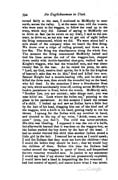
[p. 394]
turned fairly to the east, I motioned to McMurdy to steer north, across the valley. I, at the same time, told the women, who were next to the waggon, to follow the road up to the troop, which they did. Instead of saying to McMurdy not to drive so fast (as he swore on my trial), I said to the contrary, to drive on, as my aim was to get out of sight before the firing commenced, which we did. We were about half a mile ahead of the company when we heard the first firing. We drove over a ridge of rolling ground, and down on a low flat. The firing was simultaneous along the whole line. The moment the firing commenced McMurdy halted and tied his lines across the rod of the waggon-box, stepped down coolly with double-barrelled shot-gun, walked back to Knight's waggon, who had the wounded men, and was about twenty feet in the rear. As he raised his piece, he said, "Lord, my God, receive their spirits, for it is for the kingdom of heaven's sake that we do this," fired and killed two men. Samuel Knight had a muzzle-loading rifle, and he shot and killed the three men, then struck the wounded boy on the head, who fell dead. In the meantime I drew a five-shooter from my belt, which accidentally went off, cutting across McMurdy's buskin pantaloons in front, below the crotch. McMurdy said, "Brother Lee, you are excited; take things cool; you was near killin' me. Look where the bullet cut," pointing to the place in his pantaloons. At this moment I heard the scream of a child. I looked up and saw an Indian have a little boy by the hair of his head, dragging him out of the hind end of the waggon, with a knife in his hand, getting ready to cut his throat. I sprang for the Indian with my revolver in hand, and shouted to the top of my voice, "Arick, oomo, cot too sooet" (stop, you fool!). The child was terror-stricken. His chin was bleeding. I supposed it was the cut of a knife, but afterwards learned that it was done on the waggon-box, as the Indian yanked the boy down by the hair of the head. I had no sooner rescued this child than another Indian seized a little girl by the hair. I rescued her as soon as I could speak; I told the Indians that they must not hurt the children—that I would die before they should be hurt; that we would buy the children of them. Before this time the Indians had rushed around the waggon in quest of blood, and despatched the two runaway wounded men. In justice to my statement I would say that if my shooter had not prematurely exploded, I would have had a band in despatching the five wounded. I had lost control of myself, and scarce knew what I was about.
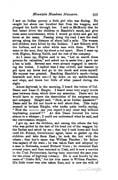
[p. 395]
I saw an Indian pursue a little girl who was fleeing. He caught her about one hundred feet from the waggon, and plunged his knife through her. I said to McMurdy that he had better drive the children to Hamblin's ranch, and give them some nourishment, while I would go down and get my horse at the camp. Passing along the road I saw the dead strung along the distance of about half a mile. The women and children were killed by the Indians. I saw Schurtz with the Indians, and no other white man with them. When I came to the men, they lay about a rod apart. Here I came up with Higbee, Bishop Smith, and the rest of the company.
As I came up, Higbee said to me, "Let us search these persons for valuables," and asked me to assist him; gave me a hat to hold. Several men were already engaged in searching the bodies. I replied that I was unwell, and wanted to get upon my horse and go to the ranch and nurse myself. My request was granted. Reaching Hamblin's ranch—being heartsick and worn out—I lay down on my saddle-blanket and slept, and knew but little of what passed during the night.
About daybreak in the morning, I heard the voices of Col. Dame and Isaac C. Haight. I heard some very angry words pass between them, which drew my attention. Dame said he would have to report the destruction of the emigrant camp and company. Haight said, "How, as an Indian massacre?" Dame said he did not know so well about that. This reply seemed to irritate Haight, who spoke quite loudly, saying, "How the —— can you report it any other way without implicating yourself?" At this Dame lowered his voice almost to a whisper; I could not understand what he said, and the conversation stopped.
I got up, saw the children, and among the others the boy who was pulled by the hair of his head out of the waggon by the Indian and saved by me; that boy I took home and kept until Dr. Forney, Government agent, came to gather up the children and take them East; he took the boy with the others; that boy's name was William Fancher; his father was captain of the train; he was taken East and adopted by a man in Nebraska, named Richard Sloan; he remained East several years, and then returned to Utah, and is now a convict in the Utah Penitentiary, having been convicted the past year for the crime of highway robbery. He is now known by the name of "Idaho Bill," but his true name is William Fancher. His little sister was also taken East, and is now the wife of
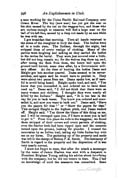
[p. 396]
a man working for the Union Pacific Railroad Company, near Green River. The boy (now man) has yet got the scar on his chin caused by the cut on the waggon-box, and those who are curious enough to examine will find a large scar on the ball of his left foot, caused by a deep cut made by an axe while he was with me.
I got breakfast that morning. Then all hands returned to the scene of the slaughter to bury the dead. The bodies were all in a nude state. The Indians, through the night, had stripped them of every vestige of clothing. Many of the parties were laughing and talking as they carried the bodies to the ravine for burial. They were just covered over a little, but did not long remain so; for the wolves dug them up, and, after eating the flesh from them, the bones laid upon the ground until buried, some time after, by a Government military officer. At the time of burying the bodies Dame and Haight got into another quarrel. Dame seemed to be terror-stricken, and again said he would have to publish it. They were about two paces from me. Dame spoke low, as if careful to avoid being heard. Haight spoke loud, and said, "You know that you counselled it, and ordered me to have them used up." Dame said, "I did not think that there were so many women and children. I thought they were nearly all killed by the Indians." Haight said, "It is too late in the day for you to back water. You know you ordered and counselled it, and now you want to back out." Dame said, "Have you the papers for that?" or "Show the papers for that." This enraged Haight to the highest pitch, and Dame walked off. Haight said, "You throw the blame of this thing on me, and I will be revenged upon you, if I have to meet you in hell to get it." From this place we rode to the waggons; we found them stripped of their covers and every particle of clothing, even the feather beds had been ripped open and the contents turned upon the ground, looking for plunder. I crossed the mountains by an Indian trail, taking my little Indian boy with me on my horse. The gathering up of the property and cattle was left in the charge of Bishop P. K. Smith. The testimony of Smith in regard to the property and the disposition of it was very nearly correct.
I must not forget to state, that after the attack a messenger by the name of James Haslem was sent with a despatch to President Brigham Young, asking his advice about interfering with the company, but he did not return in time. This I had no knowledge of until the massacre was committed. Some
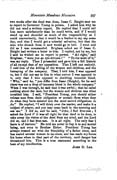
[p. 397]
two weeks after the deed was done, Isaac C. Haight sent me to report to Governor Young in person. I asked him why he did not send a written report. He replied that I could tell him more satisfactorily than he could write, and if I would stand up and shoulder as much of the responsibility as I could conveniently, that it would be a feather in my cap some day, and that I would get a celestial salvation, but that the man who shrank from it now would go to bell. I went and did as I was commanded. Brigham asked me if Isaac C. Haight had written a letter to him. I replied, not by me, but I said he wished me to report in person. "All right," said Brigham; "were you an eye-witness?" "To the most of it," was my reply. Then I proceeded and gave him a full history of all except that of my opposition. That I left out entirely. I told him of the killing of the women and children, and the betraying of the company. That, I told him, I was opposed to, but I did not say to him to what extent I was opposed to it, only that I was opposed to shedding innocent blood. "Why," said he," you differ from Isaac >(Haight), for he said there was not a drop of innocent blood in the whole company." When I was through, he said that it was awful; that he cared nothing about the men, but the women and children was what troubled him. I said, "President Young, you should either release men from their obligation or sustain them when they do what they have entered into the most sacred obligations to do." He replied, "I will think over the matter, and make it a subject of prayer, and you may come back in the morning and see me." I did so, and he said, "John, I feel first-rate; I asked the Lord if it was all right for that deed to be done, to take away the vision of the deed from my mind, and the Lord did so, and I feel first-rate. It is all right. The only fear I have is of traitors." He told me never to lisp it to any mortal being, not even to Brother Heber. President Young has always treated me with the friendship of a father since, and has sealed several women to me since, and has made my house his home when in that part of the territory, until danger has threatened him. This is a true statement according to the best of my recollection.
JOHN D. LEE